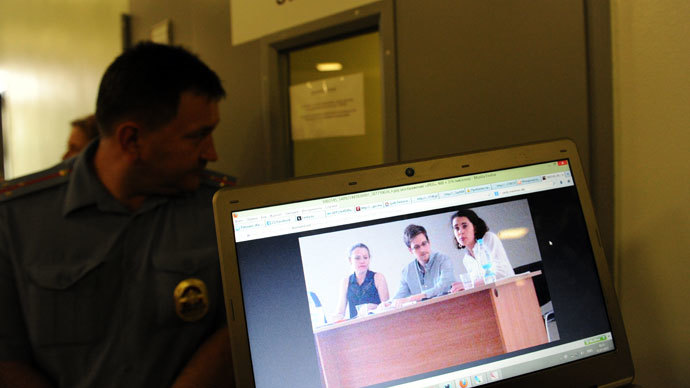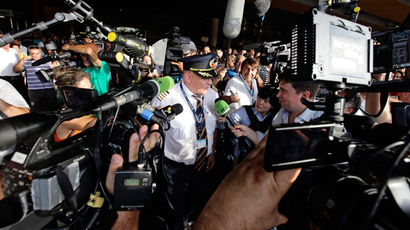Greenwald: Snowden has enough information to cause US govt ‘worst damage in history’

Former NSA contractor and whistleblower Edward Snowden possesses dangerous information which could potentially lead to America's “worst nightmare” if it is revealed, according to the journalist who first published Snowden's leaked documents.
“Snowden has enough information to cause more damage to the US
government in a minute alone than anyone else has ever had in the
history of the United States,” Glenn Greenwald, the Guardian
journalist responsible for publishing some of Snowden’s first
leaks, told Argentina-based newspaper La Nación.
“But that's not his goal. His objective is to expose software
that people around the world use without knowing what they are
exposing themselves to, without consciously agreeing to surrender
their rights to privacy. He has a huge number of documents that
would be very harmful to the US government if they were made
public,” Greenwald said.
He added that Washington should be exercising care in dealing
with the Snowden because he has the potential to do further
damage to the US.
“The US government should be on its knees every day begging
that nothing happen to Snowden, because if something does happen
to him, all the information will be revealed and it could be its
worst nightmare,” he said.
Greenwald said that “the most important thing [for Snowden] is
not to end up in US custody,” describing the
government’s approach to people who reveal uncomfortable truths
as “vindictive.”
When asked whether he believed that someone would attempt to harm
or kill the whistleblower, he said that Snowden has “already
distributed thousands of documents and made sure that several
people around the world have their entire file,” stating that
it would not be beneficial for anyone to attempt assassination.
He added that the US should be praying that no one would attempt
to take Snowden’s life. “If something happens, all the
information will be revealed, and that would be [America’s] worst
nightmare,” he said.
Greenwald later responded to initial reports on the interview,
rebutting allegations that he was "blackmailing" or
"threatening" the US. He stated in a Guardian column that
the reported fact Snowden had created a "dead man's
switch" of sorts was not new, but he was rather reiterating
that it was precaution "against all eventualities," adding
that he himself does not have access to the
"insurance" documents and played no role in arranging the
dead man's switch.
Greenwald also pointed out Snowden's insistence that journalistic
discretion was exercised. "The oft-repeated claim that
Snowden's intent is to harm the US is completely negated by the
reality that he has all sorts of documents that could quickly and
seriously harm the US if disclosed, yet he has published none of
those," Greenwald wrote.

Snowden is wanted in the US on charges of espionage after
revealing details of the country’s covert surveillance programs.
He has been in limbo at Moscow’s Sheremetyevo airport since
arriving from Hong Kong on June 23. The whistleblower is seeking
to find a safe, secure transit route to Latin America, where he
has made several successful asylum requests. Greenwald told
Reuters on Tuesday that it was likely that Snowden would accept
Venezuela’s offer.
Snowden broke three weeks of hiding in the airport to speak with
human rights activists on Friday, mentioning that he would
immediately request asylum from Russia. Russian Foreign Minister
Sergey Lavrov said on Saturday: “We are not in contact with
Snowden,” adding that he has to contact the Russian Migration
Service to formally apply for asylum.
Migration officials said on Saturday that they had not received
asylum requests from Snowden.
“As of today, we haven’t gotten any applications from Edward
Snowden,” Konstantin Romodanovskiy, head of Russia’s Federal
Migration Service, told Interfax. He added that the plea will
“be considered in accordance with Russian law” if it is
received.
Greenwald told La Nación that although few countries have the
power or will to defy the US, “Russia is one of those countries.”
Snowden’s leaks have upset Washington and its friends and enemies
alike. Latin American countries were especially concerned with
the extent of spying being conducted on their internet traffic.
“Latin America feels a natural sympathy for the United States,
yet there is a great resentment for specific historic policies of
Washington toward the region. What happened to [Bolivian
President] Evo Morales’ plane in Europe induced a strong
reaction. Bolivia was treated as a colony and not a sovereign
state,” said Greenwald.
Greenwald hinted that further leaks are possible which are
relevant to South America, including documents which outline how
the US collects traffic information, the programs used, and the
number of interceptions made on a daily basis.
It was revealed at the end of June that the US spies on dozens of
foreign embassies and missions. A leaked document published in
the Guardian listed 38 foreign embassies and missions which were
spied upon in the US, describing them as “targets” under
surveillance.
News that the EU member states were targeted by US intelligence has sparked outrage among the allies. France even expressed willingness to delay the start of negotiations on a huge free trade deal between the EU and the United States, demanding an explanation for the spying practices.
“We cannot accept this kind of behavior between partners and allies,” Hollande told journalists at the beginning of July. “There can be no negotiations or transactions in all areas until we have obtained these guarantees,” he said.
“Bugging friends is unacceptable,” said Chancellor Angela Merkel's spokesman, Steffen Seibert. “We are no longer in the Cold War.”














